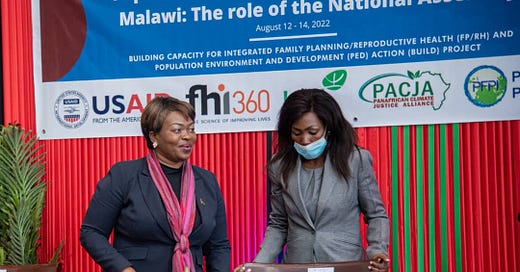Malawi Parliament Launches Parliamentary Population and Sustainable Development Caucus
"No one is determined what the number is, but it should be individual conviction to have the children that they can manage to support and give them their needs according to the resources."

Malawi: The Malawian Parliament on August 12, 2022, launched the Parliamentary Caucus on Population and Sustainable Development with the theme "Population and Sustainable Development in Malawi: The Role of the National Assembly," with the goal of slowing the country's rapid population growth.
The Caucus also aims to inform, educate, and motivate parliamentarians about the links between increasing population and issues such as reproductive health, family planning, food security, water resources, sustainable development, environment, ageing, urbanization, and migration.
The Speaker of Parliament, Catherine Gotani Hara, stated that this is a historic day for Members of Parliament and that they are aware that this Caucus will structure parliament because it is already in their standing orders.
Hara stated that development partners and the government should rely heavily on them when it comes to population growth issues because they represent Malawians.
"If you're going to give us information about what we need to tell the people, it means your telling the right people because we on daily basis are interacting with the citizens. Not only us alone but we should be part of the team that is carrying the message to our people to tell them to have children that they can manage," she explained.
"No one is determined what the number is," she added, "but it should be individual conviction to have the children that they can manage to support and give them their needs according to the resources that they have."
In his remarks, Caucus Chairperson, Abel Kayembe, stated that Malawi's population currently stands at over 19.6 million and that if current trends continue, Malawi's total population will double by the year 2040, which could pose a number of challenges if the country does not plan and put plans into action.
"According to the most recent census, females account for 50.7% of the total population. Malawi's population is largely young, with 66% of the population aged 24 and under. Notably, our annual population growth rate of 2.7% is high, as is our fertility rate of 4.2%,” he elaborated.
Speaking to one of the organizing committees that provided both technical and financial support for the event, Dr. Eliya Zulu, Executive Director of the African Institute for Development Policy (AFIDEP), stated that AFIDEP's main role is to promote the use of evidence in decision making and to build leadership so that African leaders can take charge of the African Development Challenge.
Zulu expresses his delight at seeing parliament resurrect or rekindle the Population and Sustainable Development Caucus.
He said: "They are the representatives of people who work in communities and see firsthand the problems that the country is facing with population growth. It will be very beneficial for the country to achieve MW2063 if parliament itself comes up with laws that will help to improve the policy framework that supports how issues of population management are handled."




